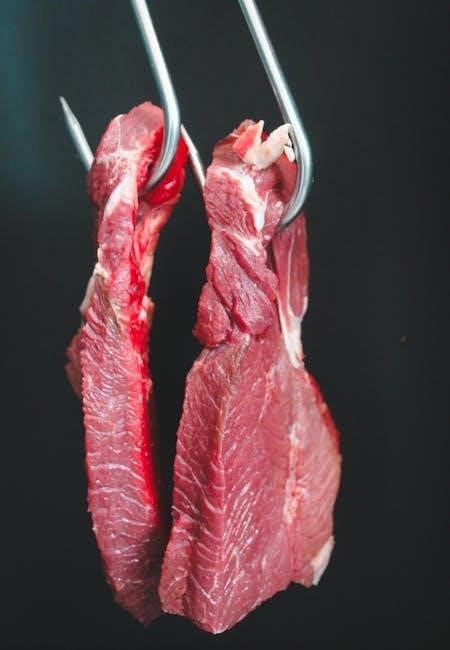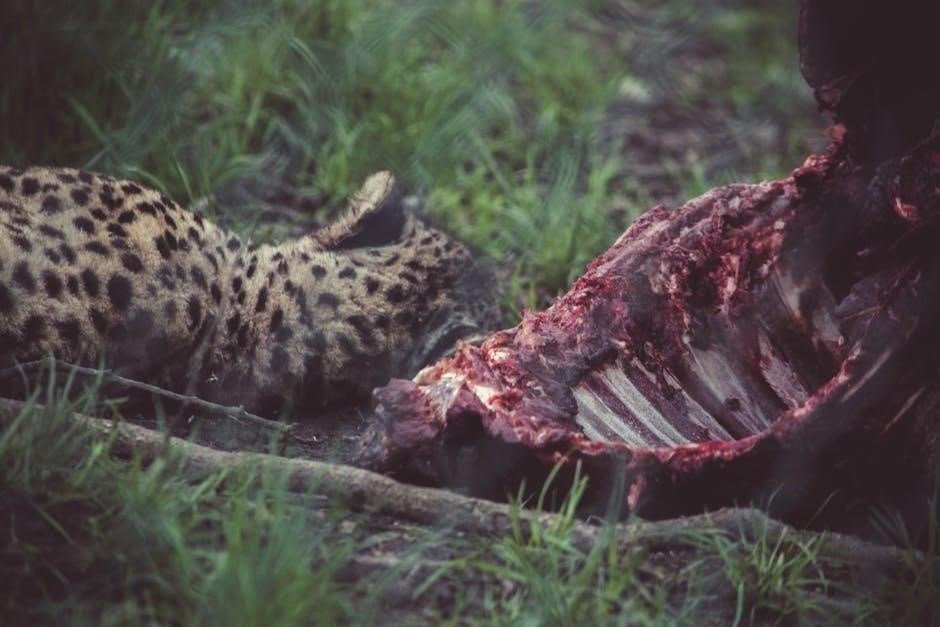The carnivore diet plan focuses on consuming only animal products, eliminating carbs and plant-based foods. It emphasizes meat, poultry, seafood, and animal-derived fats for optimal health and weight loss.
What is the Carnivore Diet?
The carnivore diet is an all-meat eating plan that excludes plant-based foods, focusing solely on animal products. It includes meat, poultry, seafood, and animal-derived fats, eliminating carbs, fruits, vegetables, and grains. Proponents believe this diet aligns with ancestral eating patterns, promoting fat loss, blood sugar regulation, and improved health. It is often referred to as the “zero-carb diet” due to its complete avoidance of carbohydrates. The diet gained popularity for its simplicity and potential health benefits, though it remains controversial among nutritional experts.
Historical Context and Evolution
The carnivore diet traces its roots to ancestral eating patterns, with early humans consuming meat for survival. It gained modern momentum through figures like Vilhjalmur Stefansson, an Arctic explorer who thrived on an all-meat diet. Recent popularity stems from advocates like Dr. Shawn Baker, who promotes it for health and performance. Once considered extreme, the diet has evolved into structured meal plans, including PDF guides for beginners and weight loss, making it more accessible. Its evolution reflects a growing interest in simplistic, high-protein diets for optimal health and longevity, despite ongoing debates about its long-term effects.
Key Principles of the Carnivore Diet
The carnivore diet revolves around consuming only animal-derived foods, excluding all plant-based products, carbohydrates, and processed items. It emphasizes meat, poultry, seafood, and animal fats as core components. The diet avoids fruits, vegetables, grains, nuts, seeds, and legumes, focusing on high-protein, high-fat intake. Meal plans, often available in PDF guides, simplify dietary choices by prioritizing animal products. This approach aims to mimic ancestral eating patterns, promoting fat loss, improved blood sugar regulation, and enhanced energy levels. By eliminating non-animal foods, the diet seeks to optimize health and performance through a simplified, nutrient-dense eating strategy.
Benefits of the Carnivore Diet
The carnivore diet promotes weight loss, improves blood sugar regulation, and enhances mental clarity. It simplifies eating by focusing on animal products, potentially boosting energy and overall health.
Weight Loss and Fat Reduction
The carnivore diet accelerates weight loss by eliminating carbohydrates, forcing the body to burn fat for energy. High-protein intake from meat and animal products increases satiety, reducing overall calorie consumption. This macronutrient approach supports ketosis, a metabolic state where fat is the primary fuel source. Many adherents report significant fat reduction, particularly in visceral fat, which is linked to improved health markers. The diet’s simplicity also enhances adherence, making sustained weight loss more achievable. By focusing on nutrient-dense animal foods, individuals often experience rapid and noticeable fat loss, contributing to a leaner, healthier physique.
Improved Blood Sugar Regulation

The carnivore diet eliminates carbohydrates, the primary source of glucose, leading to stabilized blood sugar levels. By removing sugars and starches, insulin levels drop, allowing the body to utilize stored fat for energy. This approach can be particularly beneficial for individuals with type 2 diabetes or insulin resistance, as it helps regulate blood sugar naturally. The diet’s focus on animal products provides a steady energy source without spikes or crashes. While results vary, many report improved blood sugar control, though consulting a healthcare provider is essential, especially for those managing diabetes or other metabolic conditions.
Enhanced Mental Clarity and Energy
The carnivore diet often leads to enhanced mental clarity and sustained energy levels due to the elimination of fluctuating blood sugar from carbohydrates. Animal-based foods provide a steady supply of energy, reducing brain fog and fatigue. The diet’s focus on high-quality proteins, vitamins, and minerals supports optimal brain function. Many followers report improved focus, reduced anxiety, and increased productivity. Additionally, the absence of digestive strain from plant-based foods allows the body to allocate more energy to mental performance. While individual results vary, the diet’s nutrient-dense approach is often credited with enhancing overall mental and physical vitality.

Meal Planning on the Carnivore Diet
Meal planning on the carnivore diet involves prioritizing animal-based foods, simplifying dietary choices, and utilizing resources like free PDF guides for structured meal plans and recipes.
Meal Plan for Beginners
A beginner-friendly carnivore diet meal plan focuses on simplicity and structure. Start with familiar meats like beef, chicken, and fish, paired with eggs and animal-derived fats. Include a variety of cuts, from ground meats to steaks, to ensure diversity. Seafood options like salmon and shrimp can be added for omega-3 benefits. Snacks might include pork scratchings or biltong. A printable PDF guide can help track meals and provide recipes. Emphasize pasture-raised sources for better nutrition. Gradually introduce organ meats like liver for added nutrients. Stay hydrated and consider intermittent fasting for enhanced results. A structured plan helps ease the transition and ensures adherence to the diet.
Meal Plan for Weight Loss
A carnivore diet meal plan for weight loss focuses on high-protein, high-fat animal products to boost metabolism and reduce cravings. Prioritize fatty cuts of meat like ribeye and salmon for satiety. Include organ meats such as liver for nutrient density. Seafood like shrimp and mackerel provides essential omega-3s. Pair meals with animal-derived fats like butter or tallow for energy. Portion control and meal timing are crucial; consider intermittent fasting to enhance fat burning. Printable PDF guides offer structured meal ideas and recipes tailored for weight loss goals. Staying consistent with this plan can lead to significant fat reduction and improved body composition.
Budget-Friendly Meal Plan
A budget-friendly carnivore diet meal plan focuses on affordable animal products like ground beef, chicken thighs, and pork chops. Organ meats, such as liver, are cost-effective and nutrient-dense. Incorporate fatty fish like mackerel or sardines for omega-3s without breaking the bank. Eggs and cheese can also be included for variety. Avoid processed meats and opt for bulk purchases to save money. Plan meals around seasonal or discounted cuts of meat. Printable PDF guides offer budget-friendly meal ideas, ensuring you stay on track without overspending. This approach makes the carnivore diet accessible while maintaining its health and weight loss benefits.
Common Foods on the Carnivore Diet
Common foods include meat, poultry, seafood, eggs, cheese, and organ meats, with all plant-based foods excluded for optimal health and weight loss.
Meat and Poultry
Meat and poultry are cornerstone foods on the carnivore diet, providing essential protein and nutrients. Common choices include beef, pork, chicken, turkey, and lamb. Grass-fed or pasture-raised options are preferred for higher nutritional value. Organ meats, like liver, are also encouraged for their rich vitamin and mineral content. Poultry, such as duck and quail, offers variety and additional health benefits. These foods are versatile, allowing for grilling, roasting, or cooking in ways that suit personal preferences. They are key to sustaining energy levels and supporting the diet’s goals of weight loss and improved health.
Seafood and Fish

Seafood and fish are integral to the carnivore diet, offering protein and essential nutrients. Salmon, cod, and tilapia are popular choices, along with shellfish like shrimp and mussels. These options are rich in omega-3 fatty acids, which support heart health and brain function. Wild-caught varieties are often recommended for higher nutrient density and lower mercury content. Including a variety of fish and seafood in your meal plan can enhance flavor and ensure a diverse intake of vitamins and minerals, making it a sustainable part of the carnivore diet lifestyle.
Animal-Derived Fats and Eggs
Animal-derived fats and eggs are cornerstone components of the carnivore diet, offering essential nutrients like omega-3 fatty acids and fat-soluble vitamins A, D, E, and K. Fats from sources such as tallow, lard, and butter provide sustained energy, while eggs deliver high-quality protein, B vitamins, and choline. Prioritizing pasture-raised or free-range options ensures higher nutrient density and better flavor. These foods are vital for supporting fat loss, improving blood sugar regulation, and maintaining energy levels. Incorporating diverse animal fats and eggs into your diet enhances both nutrition and satisfaction, making them indispensable for a balanced carnivore lifestyle.

Challenges and Considerations
The carnivore diet poses social challenges, requiring creative meal planning in social settings. Nutritional concerns, such as potential deficiencies, and the restrictive nature of the diet must be carefully managed.
Social and Cultural Challenges
Adopting a carnivore diet often leads to social challenges, as it contrasts with traditional meal norms. Dining out or attending gatherings can be difficult, requiring creative meal planning. Cultural expectations around food variety may clash with the diet’s restrictive nature. Social interactions often revolve around meals, making it hard to explain or justify an all-meat diet. Misunderstandings or criticism from others can arise, especially in societies valuing diverse diets. Communication strategies and confidence in one’s choices become essential for navigating these situations effectively while staying committed to the carnivore diet plan.
Nutritional Concerns and Risks
The carnivore diet raises concerns about nutrient deficiencies, particularly in fiber, vitamins, and minerals. Without plant-based foods, there’s a risk of lacking essential nutrients like vitamin C and fiber, potentially leading to health issues. High saturated fat intake may impact heart health, and the absence of antioxidants from plants could affect long-term wellness. Additionally, the diet’s restrictive nature may lead to imbalances in gut health and digestion. It’s crucial to carefully plan meals to minimize these risks and ensure adequate nutrition while following the carnivore diet plan.

Free PDF Resources
Download our 14-Day Carnivore Diet Meal Plan PDF and 30-Day Carnivore Diet Meal Plan PDF for structured guidance, printable schedules, and easy tracking of your carnivore journey.

30-Day Carnivore Diet Meal Plan PDF
Our 30-Day Carnivore Diet Meal Plan PDF offers a comprehensive guide to kickstarting your carnivore journey. With daily meal suggestions, including meat, poultry, seafood, and animal-derived fats, this plan ensures variety and simplicity. It provides structured breakfast, lunch, and dinner ideas to keep you on track. The PDF includes a 3-day and 7-day sample plan, making it easy to transition into a low-carb lifestyle. Perfect for both beginners and experienced carnivores, this resource helps you maintain consistency and achieve your health and fitness goals. Download, print, or access it on your phone for convenience.
14-Day Carnivore Diet Meal Plan PDF
Our 14-Day Carnivore Diet Meal Plan PDF is designed to simplify your transition into an all-meat lifestyle. This compact guide offers daily meal ideas, focusing on animal-based foods like meat, poultry, and seafood. It includes a printable schedule and tips for staying consistent. Perfect for beginners, this plan helps you avoid decision fatigue and ensures you meet your dietary goals. Download and print for easy reference, or keep it handy on your phone. It’s a straightforward tool to help you start your carnivore journey confidently and maintain motivation throughout the initial two weeks.
Scientific Basis and Research
Research on the carnivore diet highlights potential benefits like fat loss and blood sugar regulation, though critics argue limited scientific support and nutritional risks exist.
Studies Supporting the Carnivore Diet
Several studies highlight the carnivore diet’s potential benefits, including fat loss, improved blood sugar regulation, and enhanced mental clarity. Research suggests that focusing on animal-based foods can promote weight loss and better metabolic health. Ancestral diets, rich in meat, supported human survival and thriving. While more formal studies are needed, anecdotal evidence and small-scale research indicate positive outcomes for many adherents. The Harvard Carnivore Study, though not officially affiliated, provides insights into the diet’s impact on health markers. These findings align with the diet’s core principles of prioritizing animal products for optimal health.
Criticisms and Controversies
The carnivore diet faces criticism for its restrictive nature and lack of scientific support. Critics argue it may lead to nutrient deficiencies, particularly in fiber, vitamins, and minerals. Some studies suggest potential long-term health risks, such as heart disease and digestive issues, due to the absence of plant-based foods. Additionally, the diet’s high cost and reliance on animal products raise ethical and environmental concerns. While anecdotal reports highlight benefits, the scientific community remains skeptical, emphasizing the need for more robust research. Controversies also arise from its extreme approach, which many experts consider unsustainable for long-term health.

No Responses